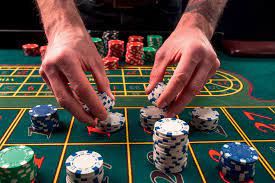Dealers provide casinos with their hallmark glimmer: warm greetings and small talk as they encourage patrons to hope that their fortune will improve.
casinos run smoothly behind the scenes. Inspectors are present to monitor bets, while dealers use discreet signs to communicate with supervisors.
How to Become a Casino Dealer
Casino dealers enjoy an attractive environment and luxurious lifestyle. Anyone considering this line of work should first enroll in a training program to learn the rules and regulations of each game they will deal, before applying to casinos and taking part in auditions or interviews for positions.
Casino dealers are responsible for informing patrons about the rules of each game, taking bets, operating each table and making payouts when needed. Furthermore, dealers help manage any disruptive customers so that other players have a pleasant gaming experience; any disputes outside their jurisdiction should be reported immediately to the floor manager for resolution.
Dealers need to be physically fit as they must stand on their feet for hours at a time during each shift in an often-smoky environment. Their position requires outstanding math skills and analytical reasoning abilities that enable them to quickly calculate winning bets quickly; additionally they must possess in-depth knowledge of each game so as to explain its nuances to players of various skill levels. While most dealers work at casinos, opportunities do exist on cruise ships and event planning companies that host casino nights.
Working Conditions
If you imagine dealing in casinos to be glamorous and luxurious, you might be taken aback to discover that it is in fact quite the contrary. Dealing requires great communication skills in addition to facilitation of games; dealers must answer customer inquiries, deal with disruptive patrons, and always maintain an ideal gaming atmosphere.
Working as a dealer can be physically taxing. Standing and watching over-the-table games for extended periods can tire out your body, and noise levels in casinos can often become overwhelming; some casinos require their dealers to wear earplugs during busy times to reduce noise pollution.
At times, dealers also experience psychological and emotional strain from their work environments. One study concluded that female casino workers who experienced sexual harassment reported lower job satisfaction despite not quitting more frequently – suggesting that working conditions contribute to pathological gambling among casino workers.
Casino dealers face additional stress from performing under pressure to meet customer expectations. Beyond needing to be quick on their feet and accurate when calculating payouts, dealers must abide by state gaming regulations as well as monitor game play for cheating or other forms of violation. Therefore, many casinos encourage dealers to keep games going quickly to maximize profit; this could lead to players making poor playing decisions that hurt both them and their casino’s bottom line.
Pay
Casino dealer careers can be rewarding and satisfying; however, not everyone would make an ideal casino dealer. Their demanding job requirements require excellent customer service skills as well as mathematical proficiency and the ability to work quickly under pressure.
Many casinos provide on-the-job training for new dealers, covering policies and procedures of their casino as well as tuition reimbursement costs associated with college classes taken to enhance knowledge and skills. Depending on the size of casino, dealers may also qualify for various benefits like health insurance, vacation time and 401K match programs.
Dealers can enjoy not only an hourly salary but also additional income through tips and year-end bonuses – creating an extremely profitable opportunity for those willing to put in the necessary work and dedication to succeed in this profession.
As with any job, working as a dealer has its share of downsides; specifically when it comes to dealing with customers at casinos. Some dealers may face rude and aggressive behavior from players if they lose a game; daily and weekly earnings fluctuations also pose risky career choices for some dealers; nonetheless, its exciting atmosphere and ability to travel make this position appealing for many people.
Requirements
Being a casino dealer may seem like an attractive career path, but it comes with its own set of challenges. Being a dealer requires excellent customer service skills as well as handling high rollers quickly while making payments quickly – not to mention spending most of their shift on their feet surrounded by smoking patrons!
As a successful dealer, it is essential that candidates understand the rules of each game as well as possessing strong mathematical ability. To acquire these abilities, candidates must participate in an intensive casino dealer training program which may last from four weeks up to several months depending on its quality. In these classes, participants will also learn local and state gambling regulations as well as tools, procedures, and processes relevant to operating as a dealer.
After successfully completing your training program, the next step should be securing an audition at your desired casino. Some casinos provide on-the-job training and hire exceptional students immediately – this is particularly common where new casinos or expansion projects are underway and need experienced dealers to train new employees.





